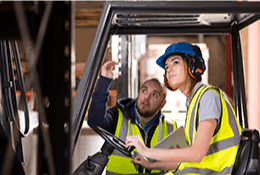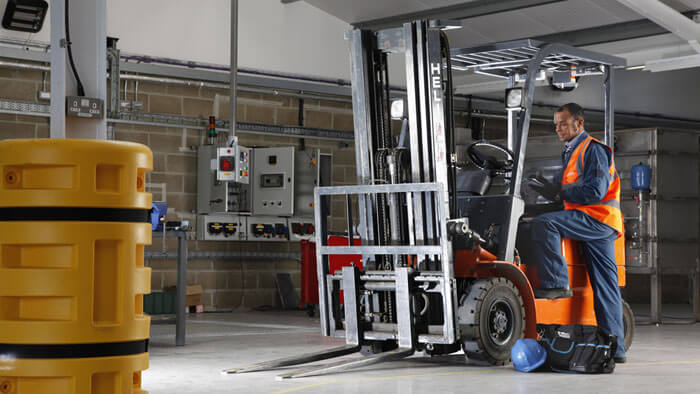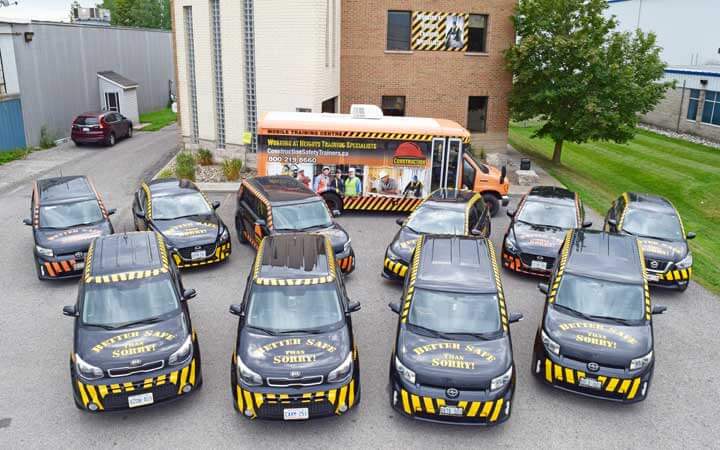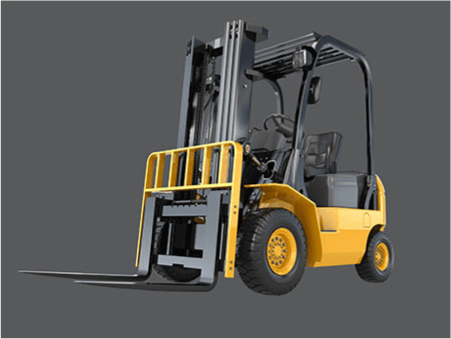
As one of the largest forklift training providers in Ontario, Industrial Safety Trainers prides ourselves in delivering impactful discussion-based training on the safe use of forklifts. In addition, our forklift safety certification follows the CSA Standard B355-15 for the Safe Operation of Lifting trucks, as well as the Ministry of Labour, Training & Skills Development “Guideline for The Safe Operation and Maintenance of Powered Lift Trucks.”
As part of the above standards, our Forklift Safety Training will see participants participate in an extensive review of the following elements:
The legal stuff
- Understanding the legal requirements for operating lift trucks in Ontario
Understanding the hazards of working with lift trucks
- Time is taken to discuss with participants the main contributing factors to accidents, incidents or near misses involving forklift equipment.
- As part of that discussion, we go into detail the top 4 hazards associated with the operation of a lift truck which are:
- The people factor– how people contribute to accidents or incidents
- The equipment we operate – do we understand it, do we have the right equipment?
- The environment we work in and
- The materials we move – do we know elements like weight and balance?
All of the above will be tied to the work environment the participant works in to make it specific to their work.
 Understanding your lift truck
Understanding your lift truck
- A discussion on the need to inspect your lift truck and what to look for
- Lift truck stability triangle and trapezoid, the center of gravity load, the capacity of your lift truck or forklift
- The effects of speed, acceleration, sharp cornering, etc.
- Main components of the lift truck with an emphasis on the lifting/handling systems and their basic functions
- Fueling of a lift truck including Propane, Diesel and Batteries (If your forklifts use propane, your operators are required to undergo training in the safe use and handling of propane cylinders and Propane Cylinder Exchange under TSSA standards)
What are the rules for operating a lift truck?
- This is where we discuss the specific rules that should be followed when operating a lift truck. Our focus will be on what rules would apply to your work environment. This may see the trainer creating a “Safety Rules To Follow” sheet where he/she would pull from the participants the rules that they agree need to be followed by forklift operators. This is a workshop that encourages participants to follow the safety rules as defined by themselves.
Practical Evaluations
- It is essential that the participants are evaluated on the forklift equipment they would be expected to be used in the environment they will be working in. This is not a driving test where people will pass or fail, but more of an evaluation of the operator’s skill set at the time of the evaluation.
- When our account managers set up training, you will be asked what kinds of equipment you would want operator evaluations done on. Some businesses may have different types of forklift equipment and require operator evaluations on each piece of equipment. As part of our standard forklift safety training, it includes an operator evaluation on one piece of equipment. Additional charges may apply if more than one piece of equipment is evaluated.
- In the case of participants attending one of our public training sessions, arrangements may be made that would see the trainer attending your workplace to perform the operator evaluation. Again, this is included in the price of the course.
- Suppose persons attending one of our public training sessions and are not currently employed by a business. In that case, we do not have lift trucks on-site to practice on or to conduct an operator evaluation. However, we will provide you with a certificate indicating that if you get a job at a business, that we will send a trainer to that business and conduct an operator evaluation on your skillset and provide your employer with a record of training and documentation supporting the training that you have received. Again, this is no cost to your new employer.
Program Details
Program Duration
6 Hours
Distance Learning Duration
4-5 hours
Min Participants
5
Max Participants
N/A
Who Should Attend?
Mandatory training program for all those who are authorized to operate forklifts classes I, II, IV, V. And for those who supervise workers who operate lift trucks
Available Locations
![]() Public Classroom
Public Classroom
![]() On-Site
On-Site
![]() Distance Course
Distance Course
Course Includes:
- Manuals
- Wall Certificate
- Forklift Wallet Certificate
- Records of Training
- Attendance Record
- Tests
- Completed Practical Evaluations
Do you also need..
ARE YOU LOOKING FOR SOMETHING SPECIFIC?
About Industrial Safety Trainers
We at Industrial Safety Trainers believe that we can make a difference. We provide training and consulting services that will change the way workers look at safety in the workplace. We offer a very unique way of training; a discussion based method of learning. Our training team is a highly skilled group of certified professionals with a wealth of industry experience and work related background but most importantly, they are passionate about safety training. Our support staff strives to understand our client realities and through collaboration and purposeful listening ensures facilitation of each specific training or consulting request. Each team member works tirelessly to make the registration process for training courses easy and enjoyable.
We operate offices out of Barrie and Ottawa. Industrial Safety Trainers is becoming one of the largest training providers in Canada. Training can take place at a variety of different training venues such as our state of the art mobile training center called the Safety Bus, our conference centers located at either our head office in Barrie or our new training centre in Ottawa, along with other locations that we feel are appropriate for training courses to be delivered.

“We believe the goal of making a workplace safe should not be a burden to the employer, it should be easy and affordable. We strive to ensure that our clients are educated about the applicable provincial and federal safety laws and how they should be applied.”


